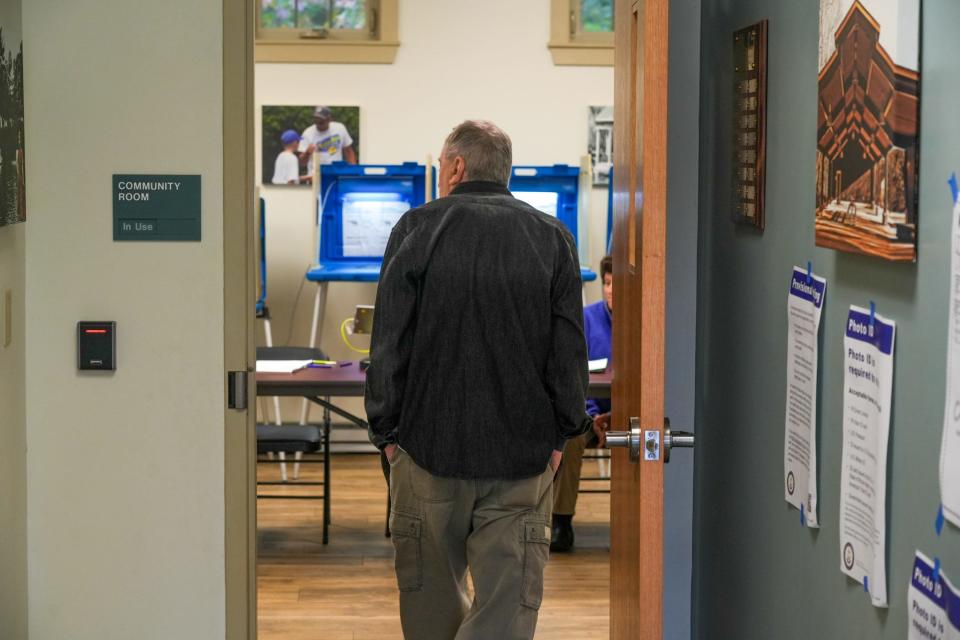This commission agrees RI's voting system is not the best, but can't agree on what's better
PROVIDENCE – A months-long deep dive into alternative options to Rhode Island's current election system for the governor and other top state officers has ended without a consensus on what might be better.
The way it works now has the candidate receiving the largest number of votes declared the winner under state law and the Rhode Island Constitution, even when the person receives less than 50% of the total vote.
Gov. Dan McKee won a crowded Democratic primary last year with 32.8% of the vote. Former Gov. Gina Raimondo won her first term as governor in 2014 with 40.7% of the general election vote, and former Gov. Lincoln Chafee, running as an independent, with 36.1% of the vote.
What did the commission find?
In a final report approved on Tuesday, a special Senate commission chaired by Sen. Samuel Zurier spelled out the perceived problem:
"In an ideal democratic election, the winning candidate will gain support from a majority of a broad base of voters," the report says. "Rhode Island's current voting system, with partisan primaries and plurality elections, has produced outcomes that fall short of that ideal, sometimes leaving voters questioning whether their elected officials truly represent the will of the majority. To address that issue, this commission was established."
But a seismic change in how Rhode Islanders elect their top leaders "should not be tested or impaired by reform for its own sake," the report says.

Runoff elections, ranked-choice voting among options explored
Among the options:
Runoff elections between the two top vote-getters in a preliminary, nonpartisan election
The more complicated ranked-choice voting, where voters get to pick their first, second, third and fourth choices, with the losers' votes moving to the next candidate up, potentially changing the outcome.
The report acknowledges the potential upsides and downsides of these approaches.
Among the upsides of ranked choice voting: the 270 votes cast early for congressional candidate Don Carlson, before he dropped out of the 1st District race, would have gone to each of those voters' second choices. (One could argue the larger problem in that case was the 20 days of early in-person voting Rhode Island allows.)
Among the downsides of having voters rank their choices is how long it may take to know who won.
More: RI agency at the center of the 2024 election is about to undergo a big leadership change
"While it took Maine officials eight days to collect the ballots before running the RCV tabulation in 2018, other [ranked-choice voting] locations produce results on election night, like San Francisco, California and Boulder, Colorado," the report says.
The report says, "Two of the alternatives, namely top two and ranked choice, could provide opportunities to bring Rhode Island's elections closer to the ideal, where a winning candidate receives a majority of all votes cast, but each also presents issues for voter education, election administration and potential legal challenge."
In the end, the seven-member commission "did not reach a consensus as to whether the advantages presented for any one of the alternative voting systems justifies taking on the implementation, education and legal issues associated with it."
Other options presented
But the report does suggest a test of how ranked-choice voting might work during a future presidential primary.
The argument: "Presidential primaries present a viable small-scale test of [ranked choice voting] for Rhode Island, and solve problems unique to presidential primaries such as wasted votes going to withdrawn candidates. Rhode Island could easily be ready to implement RCV by the next presidential primary in 2028."
A number of people and groups weighed in on the report, including an advocacy group called itself The People's Primary, which included former Rhode Island Supreme Court Justice and GOP activist Robert Flanders; the former head of the state Democratic Party, Guy Dufault; University of Rhode Island Political Science Prof. Maureen Moakley; Gary Sasse, the founding director of the Hassenfeld Institute for Public Leadership at Bryant University, and onetime Journal Editorial Pages Editor Robert Whitcomb, among others.
The group urged state lawmakers' "serious consideration" of alternatives to the status quo, such as this:
Have a single ballot, "nonpartisan primary election" where the top two vote-getters advance to the general election. The candidate who receives the majority of votes in the general election is elected.
In the end, the commission split along these lines: Democratic Senators Zurier and Leonidas Raptakis supported legislation to usher in a top-two voting system. An early fan of ranked-choice voting, Zurier also supported the consideration of ranked choice and "the top-four voting system used in Alaska."
According to the report, Republican Sen. Anthony DeLuca believes "voters, through a referendum, should decide whether Rhode Island's plurality voting system should be changed."
For the record: the status quo evolved out of voter outrage in 1893 after a Democratic candidate for governor received more votes than the Republican but failed to win a majority, and the GOP-led legislature gave the job to the Republican who lost at the ballot box.
In another election leading up to the move to the current-day language in the Constitution, the Republican received more votes than the Democrat, but a split between a Republican Senate and Democratic House produced an impasse.
"All commissioners agree that any change must be preceded by careful preparation and education for both voters and election officials, and that important legal issues should be resolved before any election under new procedures takes place."
The commission met seven times between March and December.
This article originally appeared on The Providence Journal: Should RI change how it elects top officers? Commission can't agree.

